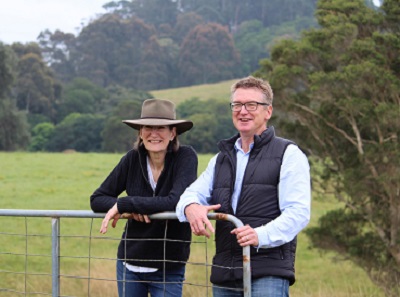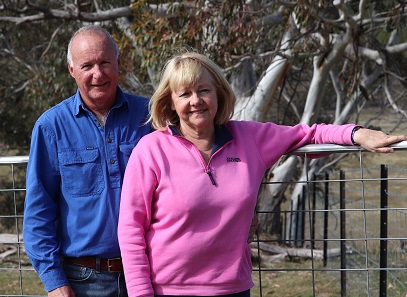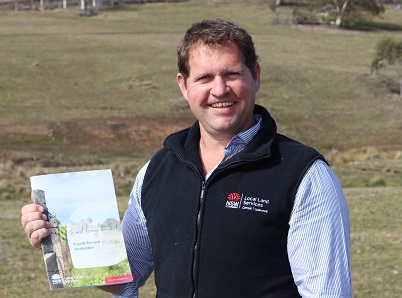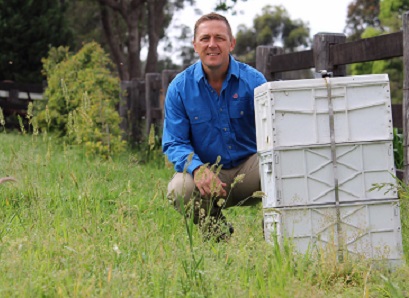Case studies: moving to a rural area
These are stories of people making the shift to rural living. If you are a NSW rural landholder of you are thinking about moving to the country, we can give you advice or assistance about rural living and owning a property.
David and Kim King, landholders
David and Kim King moved from Sydney’s Tennyson Point five years ago and bought 33 hectares at Berry in the state's south east.
They were ‘empty nesters’ in Sydney and semi-retired and had always desired to move to the country. They had owned rural property before, but purely recreational and this was their first venture into farming.
They now run an integrated enterprise of beef cattle, free range chickens and honeybees.
“When we first started we had lots of problems and it’s been a steep learning curve since then but Local Land Services has been an enormous help,” said Mr King.
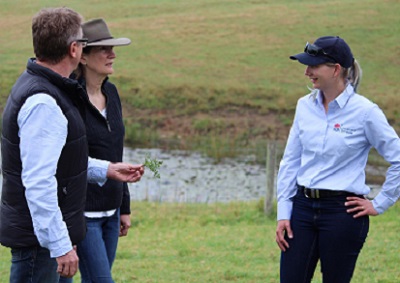
“We attended as many courses, workshops and training sessions as we could on a range of topics including pest animals, agronomy, beekeeping, weeds, sheep and cattle handling and grazing management.
“What we needed was a source of information and someone who could ask our questions and the officers of Local Land Services were really great at doing that.
“Local Land Services also connected us with support and resources such as TAFE courses on chemical handling and fencing.
“We also connected with the small farm network coordinated through Local Land Services in the south east and I always read those emails because they’re packed with good information such as grants and rebates I could apply for or topics I could learn more about.
“We’re so much more confident in running the farm today but we we would have spent more money and made more mistakes if we didn't have the help we have had from Local Land Services.
"Through the services provided by our local LLS team, we have access to a diverse group of resources and expertise that have helped us with everyday situations on the farm. We would be lost without our local LLS office.
Susan and Greg Crowe, landholders
Moved to Wallerawang with her husband Greg four years ago. They were both working in Sydney in the airline industry and dividing their time between Sydney and the farm and planning to retire in the next two years.
“My husband always wanted a farm and for 35 years he looked at property ads in The Land newspaper,” Mrs Crowe.
Finally, they were able to afford a farm and they bought a 134 hectare property that had was established in late 1800s. They retained the family home in Glebe. The farm was quite run down and overrun with blackberries, but it was what they could afford that close to Sydney.
They wanted the farm to pay for itself but knew very little about how to achieve that goal.
“We were consciously incompetent; we knew that we didn’t know anything.
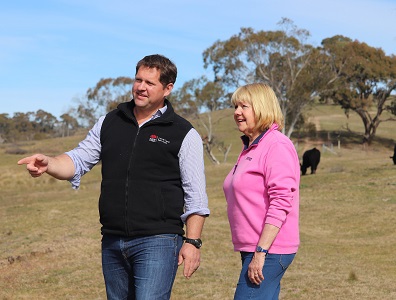
“We had no idea about the amount of work it took to control blackberries, how to improve paddocks or anything about owning livestock and then the drought hit and it all became overwhelming.”
“I was hungry for information and the stock and station agent who sold us the property put us onto Local Land Services and they have been really helpful with advice and assistance.”
“When you’re starting out, you need to surround yourself with people you can trust and Local Land Services provides such a diverse range of expertise.”
“We have connected with Local Land Services for information and training on topics including soils, pastures, livestock production, weeds and feral animals.”
They love living and working on the farm but it is always hard work.
“I think controlling weeds is the biggest issue for properties like ours and everyone needs to manage the weeds and other pests on their land responsibly.”
Four years on and Susan and Greg are breaking even with their Angus cattle enterprise, are on top of the blackberries and the property is paying for itself.
“Now we’re feeling a lot more confident and are making good decisions, thanks to advice we have received from a range of sources including our neighbours, our stock and station agent and Local Land Services.”
Peter Evans, Senior Land Services Officer
Peter Evans is a Senior Land Services Officer with Local Land Services based at Lithgow.
"Our landholders are pretty diverse, from large-scale primary producers to people who have a lifestyle block or hobby farm.
We tailor our help to what they need with the end goal of making sure our farms and environments are productive and healthy.
"We find a lot of people don’t know where to start when they own a rural property, we assist to put them in contact with the right people with the appropriate knowledge.
"It can be really daunting, but anyone in that situation should just come and talk to us at Local Land Services, we are here to help.
"The sort of help we give includes advice over the phone, information sent in an email, provide practical workshops, training, host field days and provide referral to other organisations such as the Department of Primary Industries or a local council.
"Many of people who move to rural areas or who own a rural property might not be aware of the capacity of their land and may have unrealistic expectations about what they want it to do.
"Many people are also unaware of the risks of certain types of activities and their legal responsibilities to control pests, weeds and diseases. We’re not about cracking down on people, but informing and assisting them to tackle these issues.
"One of the positives is that new landholders are not alone; for instance we coordinate group pest control programs and organise training.
"We have a range of tools to help people get the right advice to help them avoid problems. These include farm planning courses and information such as the Rural Living Handbook.
"The Handbook is a great place to start for any rural landholder who is keen to know more. It is designed so that they can springboard from there and do further investigations into specific topics.
"Local Land Services staff are very knowledgeable and approachable and there is no such thing as a silly question.”
Andrew Britton, Small Landholder Engagement Officer
As a small farms coordinator for 17 years on the NSW South Coast, he has seen a lot of demographic change, particularly from 2004 onwards as deregulation of the dairy industry as dairy farms were split up and sold off as smaller blocks.
“A lot of people moving out of Sydney and Canberra to live the dream, to have a few animals such as a cow for milk, a few chooks, maybe some cattle and generally to live a more sustainable lifestyle.”
“Many of these new rural residents are aged in their 50s and are making a transition into retirement, but what they find is that they have never worked harder in their lives – there’s a lot to do on a farm!
“Most of these people are keen to research and spend money on doing the right thing and making a change for the good of the land and local environments – they play an important part in the fabric of rural NSW, supporting healthy, productive agriculture and resilient communities.
“They call us to say, ‘I’ve just bought 40 hectares, what do I do?’ and we connect them with advice and help, like the Rural Living Handbook and our new Every Bit Counts online gateway that has a range of information specifically for small landholders.”
“What we find is that people are hungry for information in the first few years of buying a rural property and they attend all the workshops and webinars they can, which is really great.
“We’ve done some research here in the south east and found that 80 percent of people made changes to their property management after attending our workshops and 85-90 percent did further research.
“Often they’ll come back to us six or 12 months after they’ve learnt something new and then implemented it and they’ll use us as a sounding board to help decide the further steps they should take.
“Getting to know your neighbours and creating local connections is crucial so you have people bounce ideas off, learn from and even share equipment with.
“At Local Land Services we can go and talk and talk to customers, but sometimes it is not until a landholder has a cuppa or a barbeque with another landholder and sees what their neighbour is doing on the farm, that what we’re saying really hits home.”
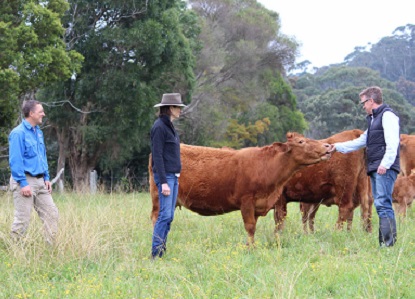
Jennie Curtis, Small Farms Network Capital Region
With her husband Chris, Jennie runs a small farm in Bywong NSW featuring a boutique Babydoll Sheep stud, market gardens and restorative land management approach.
She is secretary of the Small Farms Network Capital Region.
“Small farms networks gather people together in groups to share information and learn skills from Local Land Services and other technical experts and they are also a cost-effective way to access services.
“For our network we ask the small farmers to tell us what they need to know and then work with Local Land Services and others to design opportunities for the small farmers to get the information they need. No question is too basic or silly.”
“Often small farm owners are inexperienced at rural land management and animal husbandry but they are willing to learn. Because they come fresh to the topic, they don’t have to be persuaded to unlearn old habits.
“Based on our surveys, we know that small farm owners prefer to learn outside regular business hours and they want hands on learning, not just theory.
“They like to attend workshops on weekends and Local Land Services has been generous in accommodating that need – in return we help Local Land Services reach out to people who might otherwise have not connected with their services.
"Small farms have the capacity to be productive in different ways from larger farms and I think their production potential is often vastly underrated.
"Many small famers have strong environmental values and owners bring skills such as business and marketing savvy learned in their day jobs to their farming endeavours.
"They know what skills they are missing. Our small farms network has been able to be able to work with Local Land Services staff who have such a diverse range of technical skills and knowledge to help fill these gaps."
If you want to find out more about buying or owning a rural property here are a couple of good places to start:
- Read or download the Rural Living Handbook
- Check out the resources on our Every Bit Counts online gateway
- Call us on 1300 795 299
- Make an online enquiry at www.lls.nsw.gov.au/contact-us
